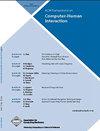Me, My Health, and My Watch: How Children with ADHD Understand Smartwatch Health Data
IF 6.6
2区 计算机科学
Q1 COMPUTER SCIENCE, CYBERNETICS
引用次数: 6
Abstract
Children with ADHD can experience a wide variety of challenges related to self-regulation, which can lead to poor educational, health, and wellness outcomes. Technological interventions, such as mobile and wearable health systems, can support data collection and reflection about health status. However, little is known about how ADHD children interpret such data. We conducted a deployment study with 10 children, aged 10 to 15, for six weeks, during which they used a smartwatch in their homes. Results from observations and interviews during this study indicate that children with ADHD can interpret their own health data, particularly at the moment. However, as ADHD children develop more autonomy, smartwatch systems may require alternatives for data reflection that are interpretable and actionable for them. This work contributes to the scholarly discourse around health data visualization, particularly in considering implications for the design of health technologies for children with ADHD.我、我的健康和我的手表:多动症儿童如何理解智能手表健康数据
患有多动症的儿童可能会经历各种各样与自我调节有关的挑战,这可能导致不良的教育、健康和健康结果。技术干预措施,如移动和可穿戴卫生系统,可支持健康状况的数据收集和反映。然而,人们对多动症儿童如何解释这些数据知之甚少。我们对10个10到15岁的孩子进行了一项为期六周的部署研究,在此期间,他们在家中使用智能手表。本研究期间的观察和访谈结果表明,患有多动症的儿童可以解释自己的健康数据,特别是在当下。然而,随着多动症儿童发展出更多的自主性,智能手表系统可能需要为他们提供可解释和可操作的数据反映替代方案。这项工作有助于围绕健康数据可视化的学术论述,特别是在考虑ADHD儿童健康技术设计的影响方面。
本文章由计算机程序翻译,如有差异,请以英文原文为准。
求助全文
约1分钟内获得全文
求助全文
来源期刊

ACM Transactions on Computer-Human Interaction
工程技术-计算机:控制论
CiteScore
8.50
自引率
5.40%
发文量
94
审稿时长
>12 weeks
期刊介绍:
This ACM Transaction seeks to be the premier archival journal in the multidisciplinary field of human-computer interaction. Since its first issue in March 1994, it has presented work of the highest scientific quality that contributes to the practice in the present and future. The primary emphasis is on results of broad application, but the journal considers original work focused on specific domains, on special requirements, on ethical issues -- the full range of design, development, and use of interactive systems.
 求助内容:
求助内容: 应助结果提醒方式:
应助结果提醒方式:


